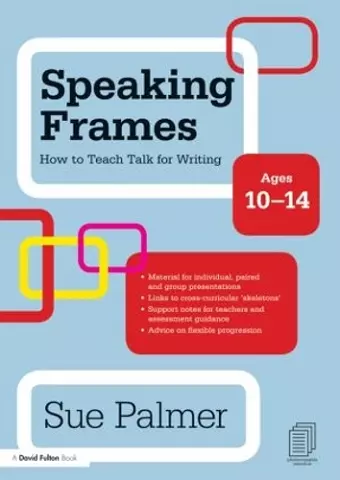Speaking Frames: How to Teach Talk for Writing: Ages 10-14
Format:Paperback
Publisher:Taylor & Francis Ltd
Published:18th Aug '10
Currently unavailable, and unfortunately no date known when it will be back
This paperback is available in another edition too:
- Hardback£145.00(9781138139916)

Now revised and expanded Speaking Frames: How to Teaching Talk for Writing: Ages 10-14 brings together material from Sue Palmer’s popular Speaking Frames books with additional material covering the primary/secondary transition. Providing an innovative and effective answer to the problem of teaching speaking and listening, this book offers a range of speaking frames for children to orally ‘fill in’, developing their language patterns and creativity, 'and boosting their confidence in the use of literate language patterns. Fully updated, this book offers:
- material for individual paired and group presentations and talk for writing
- links to cross-curricular ‘Skeletons'
- transition material and guidance on ‘bridging the gap’ between primary and secondary schools
- support notes for teachers and assessment guidance
- advice on flexible progression and working to a child’s ability
- suggestions for developing individual pupils' spoken language skills.
With a wealth of photocopiable sheets and creative ideas for speaking and listening, Speaking Frames: How to Teaching Talk for Writing: Ages 10-14 is essential reading for all practising, trainee and recently qualified teachers who wish to develop effective speaking and listening in their classroom.
Karen Bolland, Headteacher My first impression is that the books contain a good balance of background reading and photocopiable, practical ideas. I think both students and practising teachers will find these books relevant, interesting and useful. Teaching Assistants and Support staff whose brief includes speech and language support may also find them of use. ITT establishments are also likely to put them on their library shelves and include them in a reading list for their undergraduates, particularly as Sue Palmer is such a well known writer and thinker in education circles. These books would be a good addition to the staffroom shelf and may well be bought by individual teachers for use at home when planning. It could also be useful to support Teaching Assistants working with small groups on discussion ready for writing. It would certainly be a clear guide to help trainee teachers get to grips with how to help children scaffold their ideas ready for writing. I like the style of the current text; the introduction is clear and easy to read and explains the rationale behind the book really well. The photocopiable parts are well presented using child friendly fonts and the examples for teachers are very helpful. I like the way there are specific ideas for individual, paired and group work. Making the focus on age rather than Yr Group and putting it into 2 books rather than 4 would also work well as schools will feel they are getting books which can be used by a wider range of staff than with the old versions and so they are getting better value for money. The reputation of Sue Palmer and the current focus on Speaking and Listening together with the practical suggestions and photocopiable sheets would set this book apart. a Emma Watson, Primary School Teacher and Deputy Head, Oxford 1. What is your first impression of this book? Do you have a clear understanding, from the proposal, of what this book is about? This seems like and excellent idea -- I love the speaking frames as children will be familiar with writing frames and this structures their thinking. 2. We need to get a clear idea of the likely readership for the book. Please list the professionals or groups who might find the book useful. Practicing KS1, 2 3 teachers and trainees also CPD courses for Language and Literacy. 3. How familiar are you with the current edition? Do you use it, and if so, how? (personal use, teaching etc) No I don't use it at present but I will certainly recommend it to colleagues, particularly with the revisions making it more suitable for our revised curriculum. 4. What is your opinion of the proposed changes? Are all the major elements covered? If not, could you suggest topics/areas that should be covered to make the book more appropriate for use? Great, ensures that a variety of literacy skills are covered but suggesting various contexts and leaving it open for teachers to apply to their own context. 5. What are the main strengths and weaknesses of the proposal? Main strengths are the cross curricular approach and the frameworks for speaking. 6. Do you think Routledge should publish this book? Why or why not? Yes, it is current and core to developing confident young people and citizens in which we live as well as expanding horizons and developing a thinking framework for writing.
ISBN: 9780415579872
Dimensions: unknown
Weight: 318g
100 pages